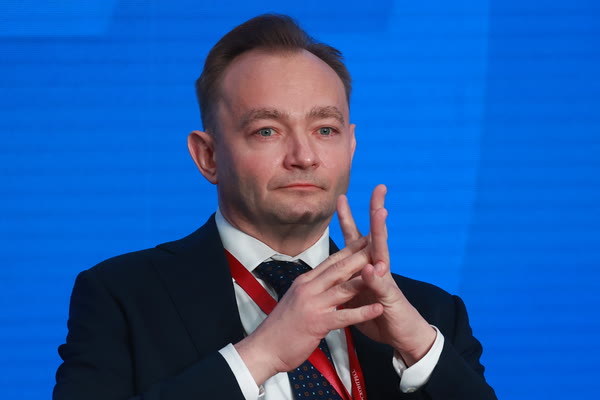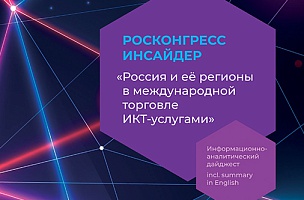The government is playing a bigger role in regulating the digital transformation
“At last year’s Forum in St. Petersburg we discussed issues related to the digital transformation. Speakers identified the main trend as being the increased role of international corporations. These companies have their own databases, which gives them immense influence across all areas of life in any country. Indeed, they are becoming quasi-states, as they perform many functions traditionally associated with governments. The question was raised as to what areas should come under the purview of the government, and what should come under the purview of these international corporations. <...> This year we are seeing a different global trend – governments are playing a bigger role in regulating the digital transformation. This is due to the fact that a new world order is taking shape. <...> In the past, we believed that the virtual space knew no borders; however, we are now faced with a situation whereby these borders exist. What’s more, bridges are being burned and new barriers are being put up,” Tigran Sargsyan, Deputy Chairman of the Board, Eurasian Development Bank.
Russia has one of the most advanced financial sectors in the world
“Objectively, Russia has one of the most advanced financial systems in the world. The country is home to a great many innovations. <...> When Apple Pay was in Russia, it was possible to add it via your bank’s mobile app. That was a Russian invention which later spread across the whole world. <...> We have a very competitive market,” Svyatoslav Ostrovskiy, Member of the Management Board, VTB Bank.
PROBLEMS
Reduced competition due to the departure of global vendors and the creation of new barriers
“I see there being a risk of reduced competition as the result of global vendors leaving our market. Paradoxical as it may seem, this could lead to a degradation in the quality of our products,” Maxim Parshin, Deputy Minister of Digital Development, Communications and Mass Media of the Russian Federation.
“I consider the main challenge to be deciding how the government is going to manage the digital transformation process in such a way as to not hinder and restrict the development of its digital expertise, its companies,” Tigran Sargsyan, Deputy Chairman of the Board, Eurasian Development Bank.
Achieving digital independence and warding off cyber-strikes
“The main problem and challenge for us is to achieve genuine digital independence,” Alexey Mordashov, Chairman of the Board of Directors, Severstal.
“The biggest threat... comes from cyber-strikes against critical infrastructure. Fortunately, there have been no such incidents. Attempts have been made, but they have not been particularly successful. I’m now speaking about a new era. In the main, everything coming at us from the southwest is fairly amateurish. <...> There’s nothing professional about these attacks. There have been professional attacks, but these have only been partially successful,” Eugene Kaspersky, Chief Executive Officer, Kaspersky Lab.
SOLUTIONS
Banning the use of non-Russian software in government buildings
“As everyone knows, a Presidential Decree was issued which bans the use of any imported, non-Russian software at critical information infrastructure sites and government buildings. This ban will come into effect on 1 January 2025. <...> For now, it is forbidden to purchase this software,” Maxim Parshin, Deputy Minister of Digital Development, Communications and Mass Media of the Russian Federation.
Developing alternative software and fostering competition
“We need to develop alternative software which will enable us to work despite being cut off from suppliers of traditional software. <...> In recent years, we have cautiously switched to the outsourcing model, and have largely incorporated all our programs at our facilities. This has helped us enormously now. We cannot be switched off with a single flick of a switch. However, it is clear that sanctions have cut us off from updates and service support. <...> We have 2–4 years to ensure that the software is fully developed in such a way that we can exist autonomously. <...> It is crucial that the public and private sectors join forces in this regard so that priorities can be drawn up and key resources identified. And then, by pooling all our resources, and with government support, we will need to solve this problem,” Alexey Mordashov, Chairman of the Board of Directors, Severstal.
“We still need to preserve an environment of competition. For this reason, we will not restrict our support to just one leader in our self-contained, substantial, but not global market. Otherwise, our high‑quality products will cease to remain so. <...> We are against the legalization of piracy. That’s not because we want to be different from our unfriendly partners, but because we, unlike them, endeavour not to undermine the foundations of doing business. <...> We need to work in a systemic way with the biggest companies and state corporations... to make teams stronger, give them the resources they need, give them an area to focus on, and give them space to be creative and to pursue their ambitions. Our market will then continue to be competitive, and will only become increasingly so,” Maxim Parshin, Deputy Minister of Digital Development, Communications and Mass Media of the Russian Federation.
A change in approach to how IT systems are developed
“We need to safeguard what we have, and set out from the start to build a new, critical infrastructure which will be, as I call it, ‘immune’. <...> We need to change our approach to how IT systems are developed. We need to make them differently,” Eugene Kaspersky, Chief Executive Officer, Kaspersky Lab.
For more information, visit the Roscongress Foundation’s Information and Analytical System at roscongress.org/en






